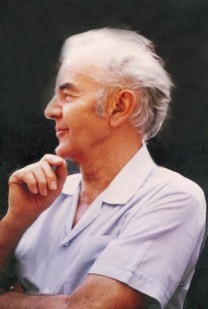Born in Essen in 1921, Friedrich-Wilhelm Funke grew up the only son of a wealthy building constructor. When he entered the University of Cologne to study national and international law the Nazis were already in power and the Second World War was about to begin. Funke´s career goal was to enter Germany´s diplomatic service and in order to be prepared he decided to combine his study of law (under Hermann Jahrreiß) with the study of anthropology. Headed by Martin Heydrich, the Cologne University´s newly established Department of Anthropology with it´s generously financed new academic program for the training of government anthropologists attracted the young student. Lucky enough to have been declared unfit for active duty he was chosen – in 1943 – to serve as Heydrich´s assistent.
After the end of the war - during Heydrich´s four-year process of denazification - Funke was promoted to deputy director of the Rautenstrauch-Joest-Museum of Anthropology in Cologne. Funke participated at the first meeting of German anthropologists after WW II (Frankfurt/Main, 19.-21.09.1946). From 1946 to 1948, he managed to organize the re-transfer of a large number of museum objects, which during the war had been stored in Saxony, then part of the Soviet-occupied zone of Germany. In 1947, Funke received his PhD in Bonn. Two years later, in 1949, when Martin Heydrich, now denazified, returned to his former positions, Funke continued as his assistant within the Cologne University. In 1953 Funke stayed for a six months field research in Indonesia. While again in field research in Indonesia in 1956, Klaus Volprecht took over Funke´s position as deputy.
Funke received his venia legendi in 1958 and was promoted to the position of „Wissenschaftlicher Rat“ (assistant professor/lecturer) in 1964. One year earlier, Funke had already started to prepare for a field trip to do research on the Sherpa in Nepal. His expedition to the Sherpa-region was realized in 1965 and generously supported financially by the Fritz Thyssen Foundation. The results of thist research were published by himself and his students in six volumes of the „Khumbu Himal“ series.
As an expert on Southeast Asian studies, Funke was promoted to Professor at the University of Cologne in 1980. In this position he retired in 1986.
Besides his scientific work, Funke was actively engaged in promoting sophisticated long-distance tourism in Germany, working out travel routes as well as accompanying groups as a tour guide. Travelling around the world or „getting out“ as he put it, has been his lifelong passion.
Funke died on June 14th, 2012.
Friedrich-Wilhelm Funke´s selected Bibliography
Funke, Friedrich-Wilhelm, Die Vorstellungswelt der Primitiven als Element der lamaistischen Volksreligion. Dissertation, Philosophische Fakultät Universität Köln, Köln 1947.
Funke, Friedrich-Wilhelm, Orang Abung: Volkstum Süd-Sumatras im Wandel. Habilitationsschrift. Leiden, E.J. Brill-Verlag, 1958.
Funke, Friedrich-Wilhelm, Im Schatten des Utan. Auf den Spuren einstiger Kopfjäger im Urwald von Sumatra. Leipzig, Brockhaus-Verlag, 1958.
Funke, Friedrich-Wilhelm, Dämmerung über Indonesien. Bremen, Carl Schünemann Verlag, 1959.
Funke, Friedrich-Wilhelm, Orang Abung: Das Leben in der Gegenwart. Leiden, E.J. Brill-Verlag, 1961.
Funke, Friedrich-Wilhelm, Ed., Beiträge zur Sherpa-Forschung. Vol. 1-6, Khumbu Himal Series, Innsbruck u. München, Universitätsbuchhandlung Wagner, 1969-1982.
Funke, Friedrich-Wilhelm, Religiöses Leben der Sherpa. Beiträge zur Sherpa-Forschung Vol. 2 (Khumbu Himal 9), Innsbruck und München, Universitätsbuchhandlung Wagner, 1969.
Funke, Friedrich-Wilhelm; Frerkes, Wilhelm; Thingo T. Tsering; Tsering, Pema and Frank, Walter A., Die Sherpa und ihre Nachbarn. Beiträge zur Sherpa-Forschung Vol. 6 (Khumbu Himal 14), Innsbruck und München, Universitätsbuchhandlung Wagner,1982.
Selected References
Leo Haupts, Die Universität zu Köln im Übergang vom Nationalsozialismus zur Bundesrepublik, Köln, Weimar and Wien, Böhlau Verlag 2007.
Ingrid Kreide-Damani, „Julius Lips, Martin Heydrich und die (Deutsche) Gesellschaft für Völkerkunde“, in: Ingrid Kreide-Damani (Ed.), Ethnologie im Nationalsozialismus. Julius Lips und die Geschichte der „Völkerkunde“. Mit Beiträgen von Andre Gingrich, Volker Harms, Lydia Icke-Schwalbe, Ingrid Kreide-Damani, Wolfgang Liedtke, Gudrun Meier, Udo Mischek und Dietrich Treide, Wiesbaden, Reichert Verlag 2010.
Lothar Pützstück, „Symphonie in Moll“. Julius Lips und die Kölner Völkerkunde. Pfaffenweiler 1995 (Kulturen im Wandel, Bd. 49).
(text and photo: I. Kreide-Damani, Mai 2012)


